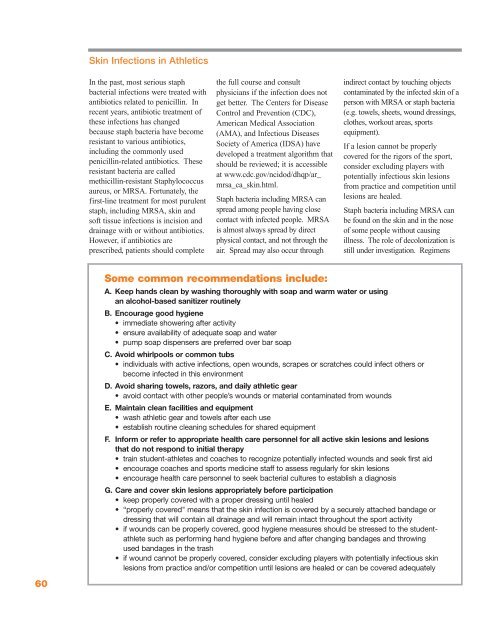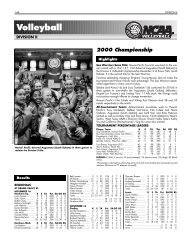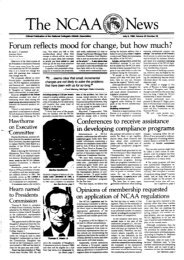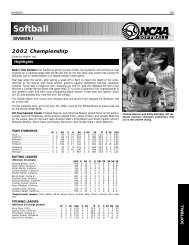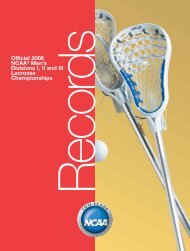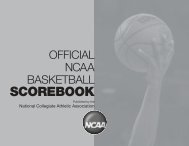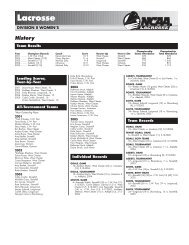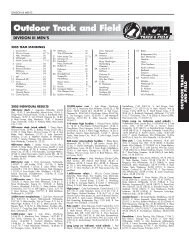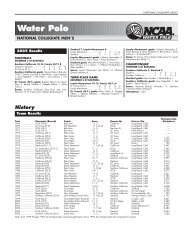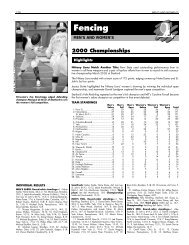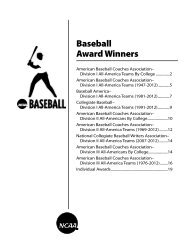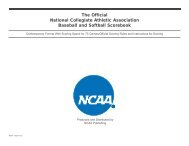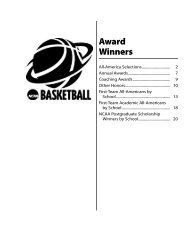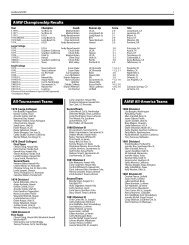Sports Medicine Handbook - NCAA
Sports Medicine Handbook - NCAA
Sports Medicine Handbook - NCAA
You also want an ePaper? Increase the reach of your titles
YUMPU automatically turns print PDFs into web optimized ePapers that Google loves.
60<br />
Skin Infections in Athletics<br />
In the past, most serious staph<br />
bacterial infections were treated with<br />
antibiotics related to penicillin. In<br />
recent years, antibiotic treatment of<br />
these infections has changed<br />
because staph bacteria have become<br />
resistant to various antibiotics,<br />
including the commonly used<br />
penicillin-related antibiotics. These<br />
resistant bacteria are called<br />
methicillin-resistant Staphylococcus<br />
aureus, or MRSA. Fortunately, the<br />
first-line treatment for most purulent<br />
staph, including MRSA, skin and<br />
soft tissue infections is incision and<br />
drainage with or without antibiotics.<br />
However, if antibiotics are<br />
prescribed, patients should complete<br />
the full course and consult<br />
physicians if the infection does not<br />
get better. The Centers for Disease<br />
Control and Prevention (CDC),<br />
American Medical Association<br />
(AMA), and Infectious Diseases<br />
Society of America (IDSA) have<br />
developed a treatment algorithm that<br />
should be reviewed; it is accessible<br />
at www.cdc.gov/ncidod/dhqp/ar_<br />
mrsa_ca_skin.html.<br />
Staph bacteria including MRSA can<br />
spread among people having close<br />
contact with infected people. MRSA<br />
is almost always spread by direct<br />
physical contact, and not through the<br />
air. Spread may also occur through<br />
Some common recommendations include:<br />
indirect contact by touching objects<br />
contaminated by the infected skin of a<br />
person with MRSA or staph bacteria<br />
(e.g. towels, sheets, wound dressings,<br />
clothes, workout areas, sports<br />
equipment).<br />
If a lesion cannot be properly<br />
covered for the rigors of the sport,<br />
consider excluding players with<br />
potentially infectious skin lesions<br />
from practice and competition until<br />
lesions are healed.<br />
Staph bacteria including MRSA can<br />
be found on the skin and in the nose<br />
of some people without causing<br />
illness. The role of decolonization is<br />
still under investigation. Regimens<br />
A. Keep hands clean by washing thoroughly with soap and warm water or using<br />
an alcohol-based sanitizer routinely<br />
B. Encourage good hygiene<br />
• immediate showering after activity<br />
• ensure availability of adequate soap and water<br />
• pump soap dispensers are preferred over bar soap<br />
C. Avoid whirlpools or common tubs<br />
• individuals with active infections, open wounds, scrapes or scratches could infect others or<br />
become infected in this environment<br />
D. Avoid sharing towels, razors, and daily athletic gear<br />
• avoid contact with other people’s wounds or material contaminated from wounds<br />
E. Maintain clean facilities and equipment<br />
• wash athletic gear and towels after each use<br />
• establish routine cleaning schedules for shared equipment<br />
F. Inform or refer to appropriate health care personnel for all active skin lesions and lesions<br />
that do not respond to initial therapy<br />
• train student-athletes and coaches to recognize potentially infected wounds and seek first aid<br />
• encourage coaches and sports medicine staff to assess regularly for skin lesions<br />
• encourage health care personnel to seek bacterial cultures to establish a diagnosis<br />
G. Care and cover skin lesions appropriately before participation<br />
• keep properly covered with a proper dressing until healed<br />
• “properly covered" means that the skin infection is covered by a securely attached bandage or<br />
dressing that will contain all drainage and will remain intact throughout the sport activity<br />
• if wounds can be properly covered, good hygiene measures should be stressed to the studentathlete<br />
such as performing hand hygiene before and after changing bandages and throwing<br />
used bandages in the trash<br />
• if wound cannot be properly covered, consider excluding players with potentially infectious skin<br />
lesions from practice and/or competition until lesions are healed or can be covered adequately


